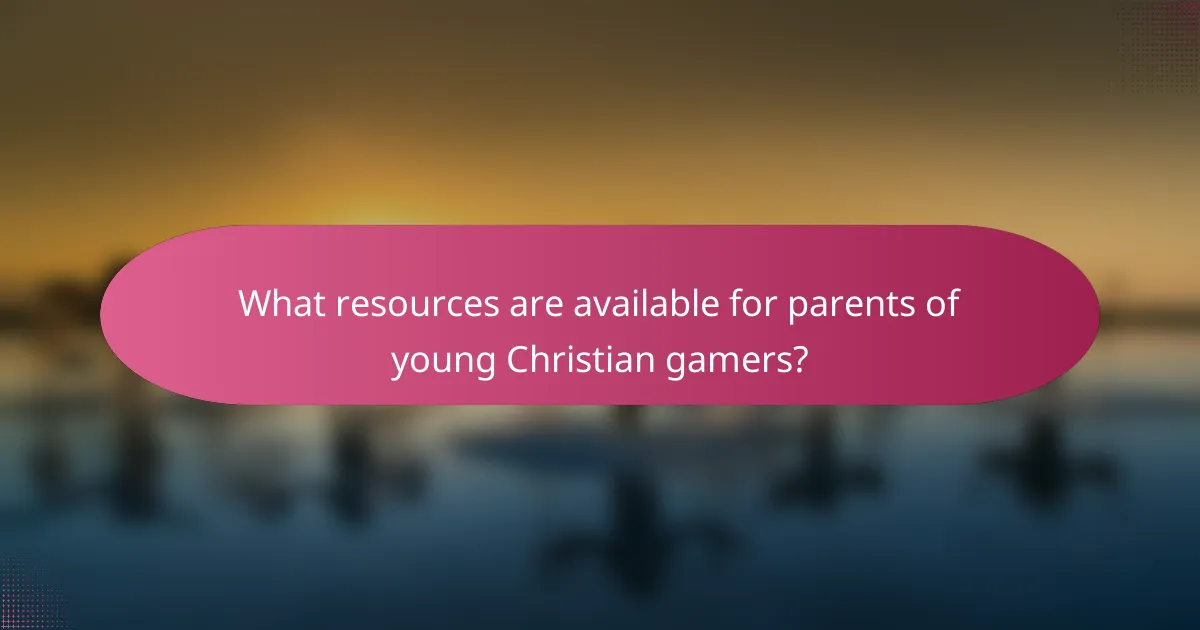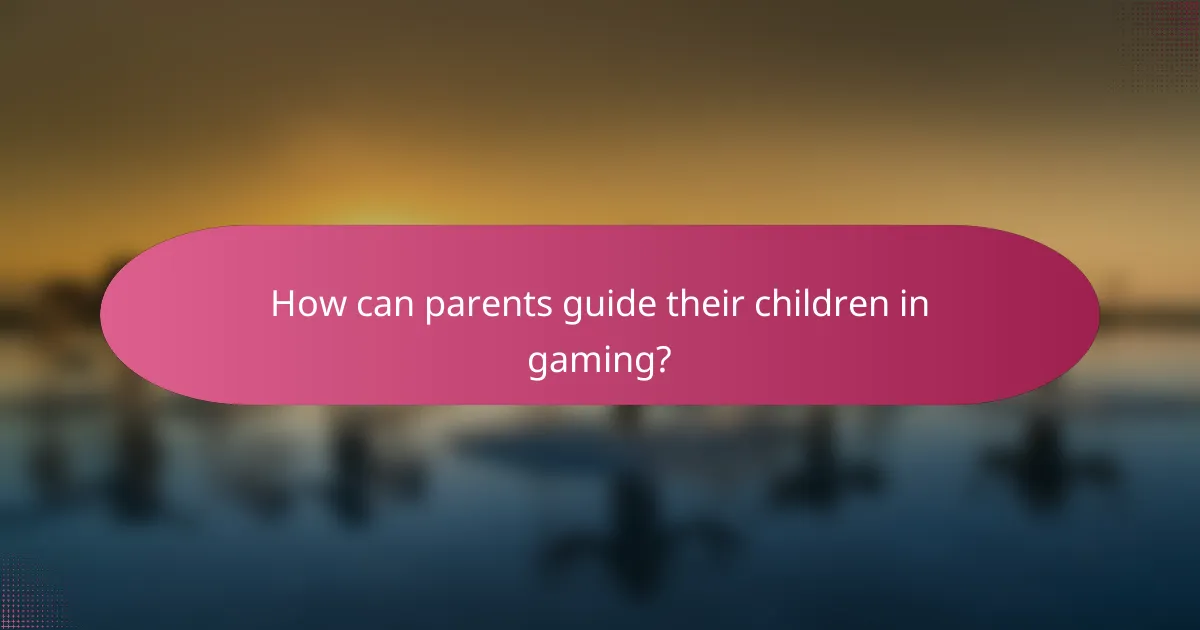Parents of young Christian gamers can find valuable resources tailored to their specific needs, including online support groups and faith-based gaming communities. By establishing clear boundaries and promoting healthy gaming habits, parents can guide their children in navigating the gaming world while reinforcing their values and fostering positive interactions.

What resources are available for parents of young Christian gamers?
Parents of young Christian gamers can access a variety of resources designed to support their unique needs. These resources include online support groups, Christian gaming communities, and parenting blogs that focus on gaming from a faith-based perspective.
Online support groups
Online support groups provide a platform for parents to connect with others facing similar challenges. These groups often discuss topics such as screen time management, game content appropriateness, and balancing gaming with other activities.
Platforms like Facebook and Discord host numerous groups where parents can share experiences, seek advice, and find encouragement. Engaging in these communities can help parents feel less isolated and more informed about their children’s gaming habits.
Christian gaming communities
Christian gaming communities offer a space for gamers to enjoy their hobby while sharing their faith. These communities often include forums, multiplayer games, and events that encourage positive interactions among players.
Participating in these communities can help young gamers develop friendships with peers who share similar values. Parents can look for platforms like “Faithful Gaming” or “Christian Gamers” to find suitable environments for their children.
Parenting blogs focused on gaming
Parenting blogs that focus on gaming provide insights and tips for managing children’s gaming experiences. These blogs often cover topics like game reviews, age-appropriate recommendations, and strategies for fostering healthy gaming habits.
Some popular blogs include “The Geeky Parent” and “Gaming with God,” which offer practical advice and resources tailored to Christian families. Reading these blogs can help parents stay informed about trends and issues in the gaming world while aligning with their values.

How can parents guide their children in gaming?
Parents can guide their children in gaming by establishing clear boundaries and promoting healthy gaming habits. This involves setting limits on playtime, encouraging age-appropriate content, and fostering positive interactions within the gaming community.
Setting gaming limits
Establishing gaming limits is crucial for maintaining a healthy balance between gaming and other activities. Parents should consider setting daily or weekly time limits, such as one to two hours on weekdays and slightly more on weekends, depending on the child’s age and responsibilities.
It’s also important to monitor the types of games being played. Parents can use rating systems like the Entertainment Software Rating Board (ESRB) to ensure that the content is suitable for their child’s age. Regular discussions about gaming choices can help reinforce these boundaries.
Encouraging positive gaming experiences
Encouraging positive gaming experiences involves selecting games that promote teamwork, problem-solving, and creativity. Parents can research games that have educational value or those that foster social interaction, such as cooperative multiplayer games.
Additionally, parents should engage with their children by playing games together or discussing their gaming experiences. This not only strengthens the parent-child relationship but also provides opportunities to teach important lessons about online behavior and sportsmanship.

What are the benefits of Christian gaming for children?
Christian gaming offers children a unique way to engage with their faith while enjoying interactive entertainment. It can foster social connections, reinforce moral teachings, and provide a safe environment for exploring values.
Building community
Christian gaming creates opportunities for children to connect with peers who share similar beliefs. Multiplayer games often include features that encourage teamwork and collaboration, allowing young gamers to form friendships based on shared values.
Parents can facilitate these connections by seeking out local or online Christian gaming groups. Participating in community events or church-sponsored gaming nights can help children build a supportive network.
Enhancing moral values
Many Christian games are designed to promote positive moral lessons, such as kindness, honesty, and perseverance. These games often incorporate biblical stories and teachings, making it easier for children to understand and apply these values in their daily lives.
When selecting games, parents should look for titles that emphasize ethical decision-making and character development. Engaging in discussions about the choices made in the game can further reinforce these moral lessons and encourage critical thinking.

How can parents address gaming addiction?
Parents can address gaming addiction by recognizing its signs early and implementing strategies to promote healthy gaming habits. Establishing clear boundaries and encouraging balanced activities can help mitigate the risks associated with excessive gaming.
Identifying signs of addiction
Recognizing gaming addiction involves observing behavioral changes in your child. Common signs include neglecting responsibilities, withdrawal from social interactions, and increased irritability when not gaming.
Monitor the amount of time spent gaming and any changes in mood or behavior. If gaming becomes a primary focus over other activities, it may indicate a problem.
Implementing healthy gaming habits
To foster healthy gaming habits, set clear time limits on gaming sessions. Aim for a maximum of one to two hours per day, depending on age and other commitments.
Encourage breaks during gaming to promote physical activity and social interaction. Consider designating specific days for gaming and others for family activities or outdoor play.
Engage in discussions about the games your child plays, focusing on content and themes. This can help them develop critical thinking skills and understand the impact of gaming on their daily life.

What are the best Christian games for young children?
The best Christian games for young children combine fun gameplay with positive messages and teachings from the Bible. These games often encourage moral values, teamwork, and creativity, making them suitable for both entertainment and spiritual growth.
Faith-based adventure games
Faith-based adventure games immerse children in engaging narratives that reflect Christian themes. Titles like “Bible Adventures” and “The Pilgrim’s Progress” allow players to explore biblical stories while solving puzzles and completing quests. These games often emphasize virtues such as courage, kindness, and perseverance.
When selecting faith-based adventure games, consider the age appropriateness and the level of challenge. Games should be accessible yet stimulating, encouraging children to think critically while reinforcing their faith. Look for games that offer cooperative play options to foster teamwork among young players.
Educational Christian games
Educational Christian games focus on teaching biblical principles and enhancing learning through interactive play. Examples include “Superbook Bible App” and “Bible Quiz Game,” which help children learn scripture and stories in a fun, engaging way. These games often incorporate quizzes, flashcards, and interactive storytelling.
To maximize the benefits of educational Christian games, choose those that align with your child’s learning style. Games that offer rewards for achievements can motivate children to engage more deeply with the material. Ensure that the content is accurate and age-appropriate to maintain a positive learning experience.

How can parents evaluate game content?
Parents can evaluate game content by reviewing ratings, descriptions, and user reviews to determine suitability for their children. Understanding the themes, gameplay mechanics, and potential risks associated with each game is essential for making informed decisions.
Understanding game ratings
Game ratings provide a quick reference for parents to gauge the appropriateness of a game for their child. Most games are rated by organizations like the Entertainment Software Rating Board (ESRB) in the United States or Pan European Game Information (PEGI) in Europe, which categorize games based on content such as violence, language, and sexual themes.
For example, an ESRB rating of “E for Everyone” indicates that a game is suitable for all ages, while a “M for Mature” rating suggests it may contain content inappropriate for children under 17. Parents should familiarize themselves with these ratings and consider their child’s maturity level when evaluating games.
Using parental controls
Parental controls are tools that allow parents to manage and restrict their children’s gaming experiences. Most gaming consoles and platforms offer built-in parental controls that enable parents to set limits on playtime, restrict access to certain games, and monitor online interactions.
For instance, parents can block games rated above a certain level or limit the amount of time their child can spend playing each day. It’s advisable to regularly review these settings and discuss them with children to ensure they understand the reasons behind the restrictions.
